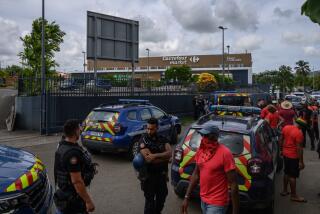CRISIS IN THE CARIBBEAN : In the Capital, U.S. Soldiers Keep to Themselves : Military: Some local denizens, like prostitutes, are disappointed. But most residents have barely noticed the occupation.
- Share via
PORT-AU-PRINCE, Haiti — The women standing in front of the waterfront hotel had put on bright lipstick, tight miniskirts and big smiles. The soldiers were in town and business was going to be great.
But the Americans weren’t calling on the Roxy Hotel prostitutes, even though thousands of the troops were living and working at Port-au-Prince’s main seaport just across Harry Truman Boulevard.
Except for brief forays into the streets to move equipment or just to make their presence known, the 10,000 U.S. troops who have been arriving since Monday are living, working and playing in near-invisibility at their temporary bases.
It’s been that way for most of Haiti; the U.S. soldiers have been largely out of sight if not out of mind and have interfered only indirectly in the lives of ordinary Haitians, at least for now.
Still, having thousands of foreign soldiers suddenly descend is bound to change lives, even if they are welcome soldiers who have come to eliminate a military dictatorship and restore exiled President Jean-Bertrand Aristide.
For instance, there are the working girls at the Roxy and the nearby My Dream Hotel, who thought the invasion was like having gold fall on them.
“I went out and bought these new clothes,” said Monique, a shiny-faced girl of perhaps 17, who, along with many prostitutes here, comes from the neighboring Dominican Republic.
“I thought there would be a lot of boys, that I would make a lot of money,” said Monique, who Frenchified her name from Maria because “it sounds sexier to an American, no?”
A companion, another Dominican who calls herself Teri, said: “I’m going back to the Jaragua (a Las Vegas-style hotel in Santo Domingo, the Dominican capital) as soon as I can. These Americans can’t even go out at night, and the Haitian men are either afraid or don’t have any money. For me, this invasion is a disaster.”
Other businesses, mainly those run by or catering to the wealthy, are suffering, but not from any American plan.
Russo, a well-appointed jewelry store that sells baubles from Tiffany’s and perfume from Chanel to the elegant women of the wealthy suburb of Petionville, has closed for the duration because its clients are afraid to go into the streets. “The ladies think the Americans or the poor will bother them,” said a Russo employee, so “they stay home.”
It wasn’t until Saturday morning that a three-vehicle Army patrol drove the seven miles from its airport base to Petionville. They drove with far more caution, patience and skill than almost any Haitian, and traffic flow actually improved.
Except for the occupation of the northern city of Cap Haitien by 1,800 Marines, the U.S. forces have yet to move outside the Port-au-Prince area.
“Our mission is to establish a secure environment,” said one Army captain, using military-speak for keeping order, “not interfere with people’s lives. If we didn’t seem so unusual, I doubt that most people would know we’re here.”
That’s not exactly the case, even if the foreigners are treading lightly. Thousands of people still gather every day outside the U.S. facilities, mostly to gawk at the troops and watch the arrival and departure of the large military planes and ships.
There have been no curfews, no closed areas other than the three main bivouac and work bases, no stops and searches. Also missing are the bar fights, the boisterous shouting in restaurants, the insensitive remarks about the local people and culture--behavior often found when young and bored soldiers congregate.
“I thought it would be like England during the war,” said a onetime Haitian diplomat, referring to the old chestnut about U.S. soldiers during World War II:
“Overpaid, oversexed and over here.”
But “it seems different here,” the diplomat said. “They are polite, smile and go about their business.” If the presence of the soldiers has one way or another closed some Haitian stores, many businesses that have reopened did so to applause and patronage.
“Look,” said a U.S. Air Force colonel who has witnessed other occupations. “The main impact right now is psychological and emotional, and that does affect people. But life will go on.
“What we have to worry about is down the road a few weeks and months when just our presence will start to irritate people. Ask me then how we’ve changed lives here. It’ll be a lot.”
More to Read
Sign up for Essential California
The most important California stories and recommendations in your inbox every morning.
You may occasionally receive promotional content from the Los Angeles Times.













